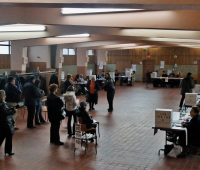In this report, Cole Edick—program assistant for the Anxieties of Democracy program—outlines the ideation and theoretical principles that served as the basis of conversation at a research workshop, held at IE University in Segovia, Spain, entitled “The Ideational Approach: Consequences and Mitigation.” Edick highlights five key challenges discussed at the workshop for the contemporary study of populism, among them: how to define populism, what unites populism across different political systems, and can social media inform the study of populism. Future endeavors assessing the modern ascendance of populism will benefit from this report, which contextualizes extant as well as ongoing research seeking to understand populism in varying contexts.





















